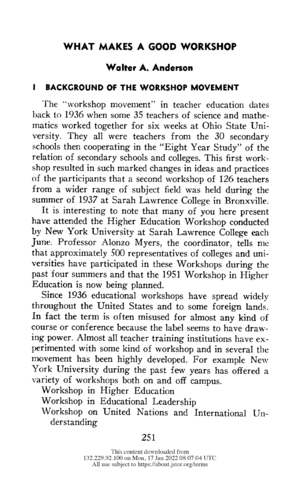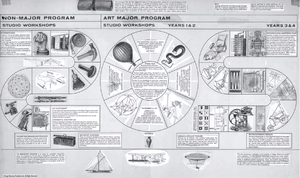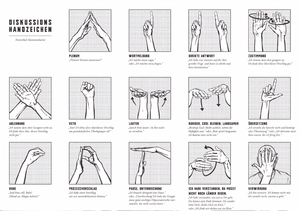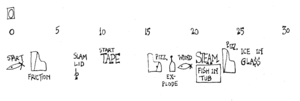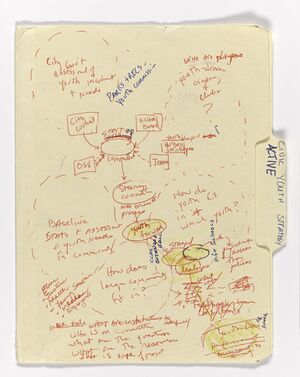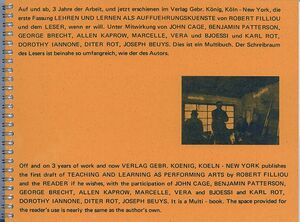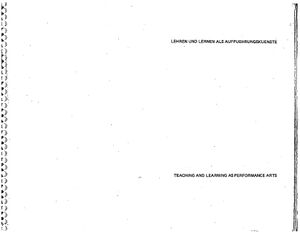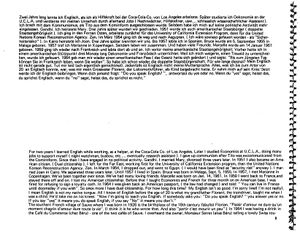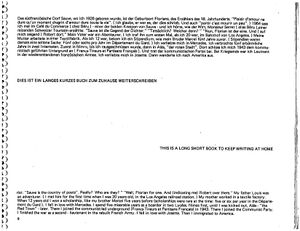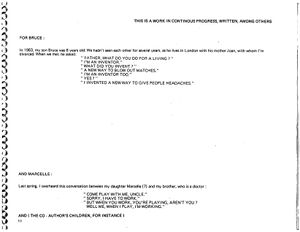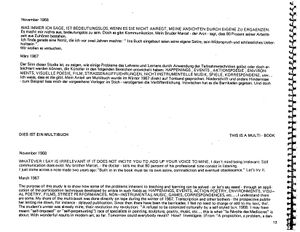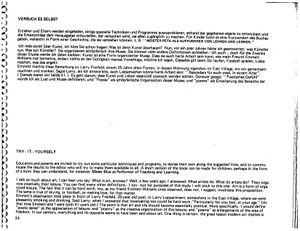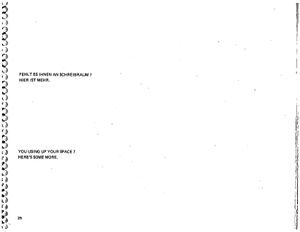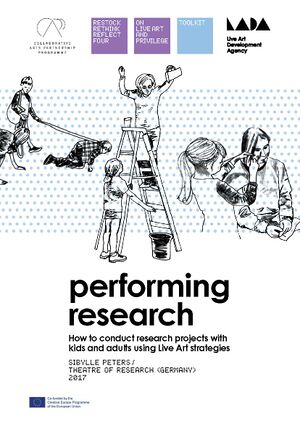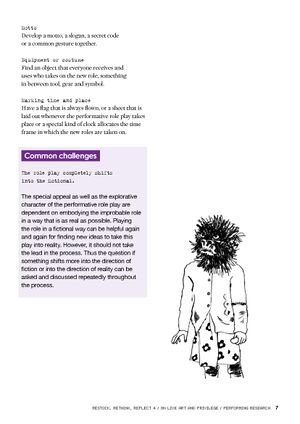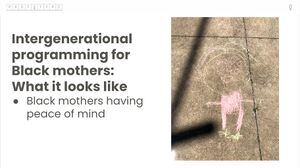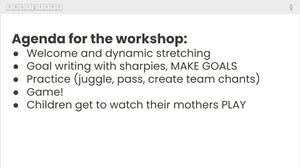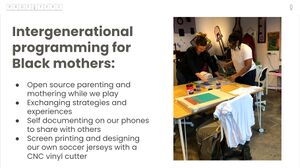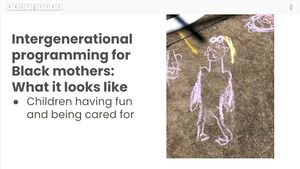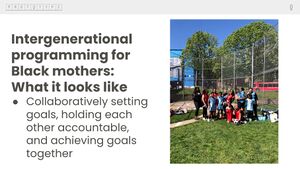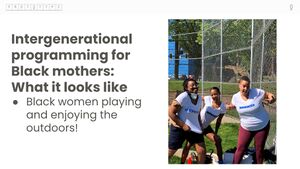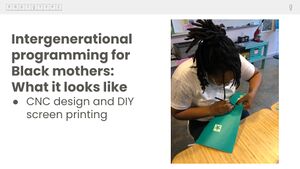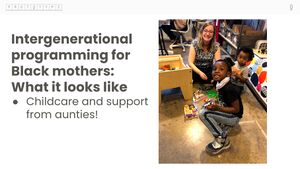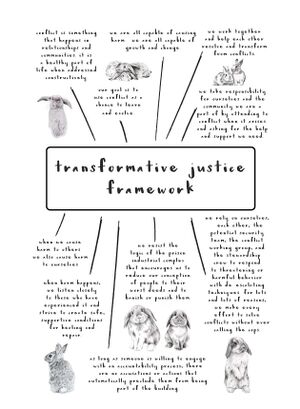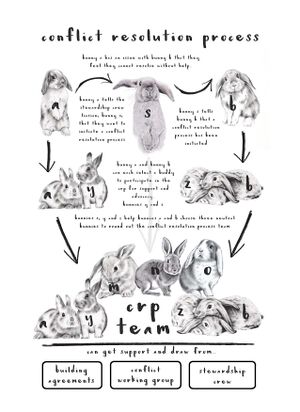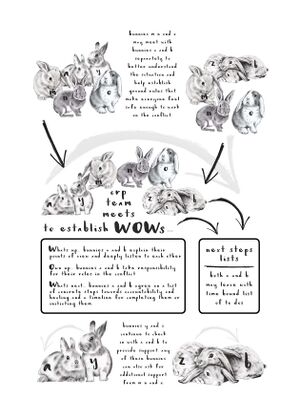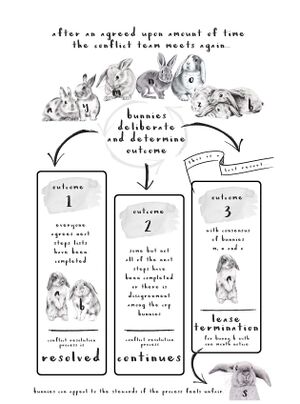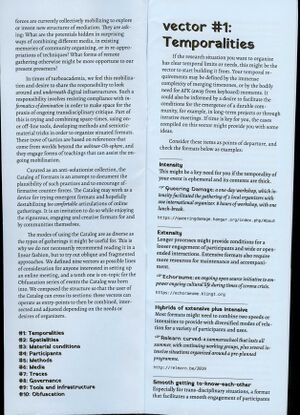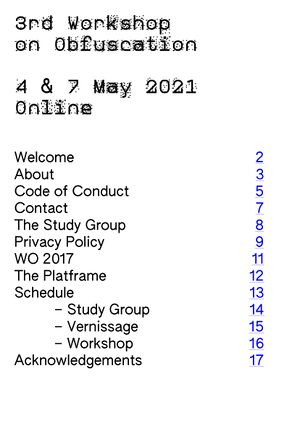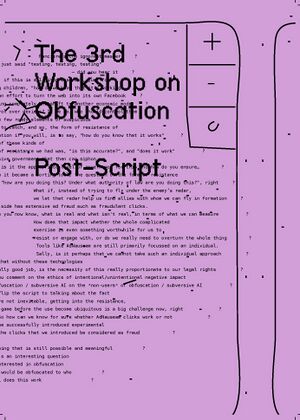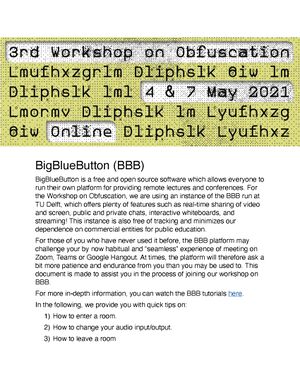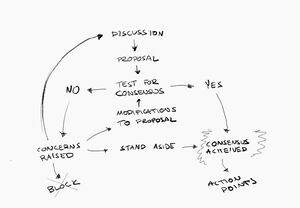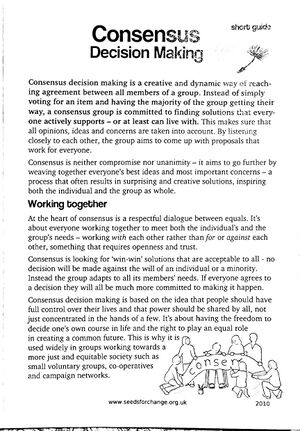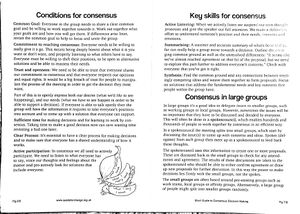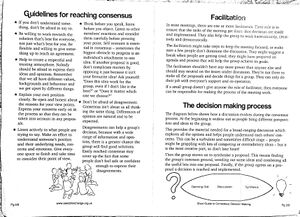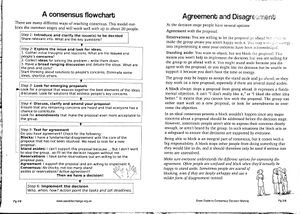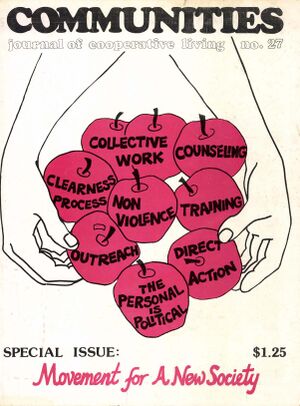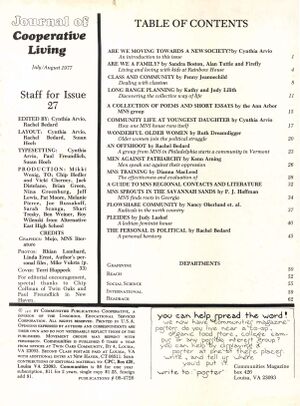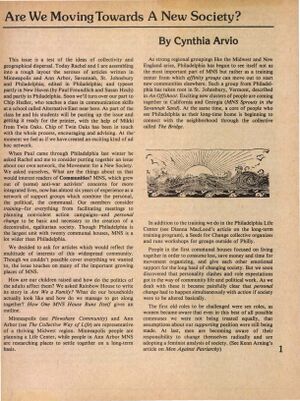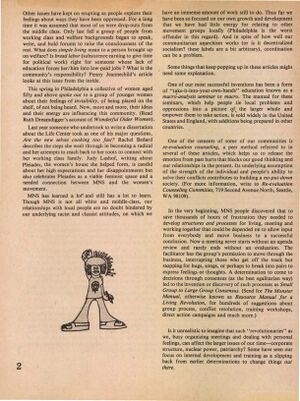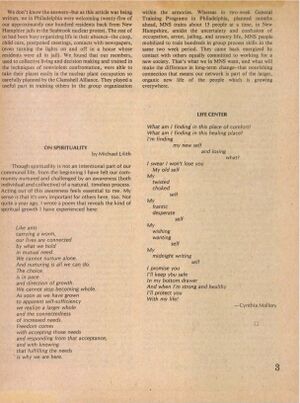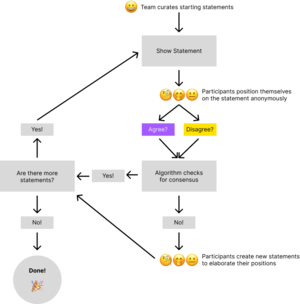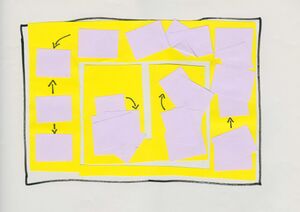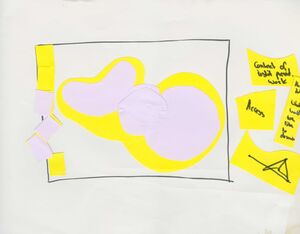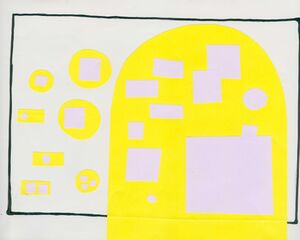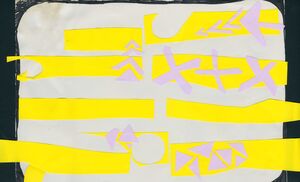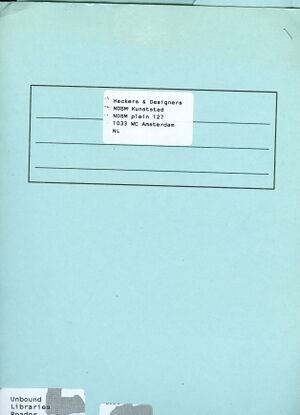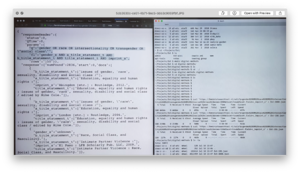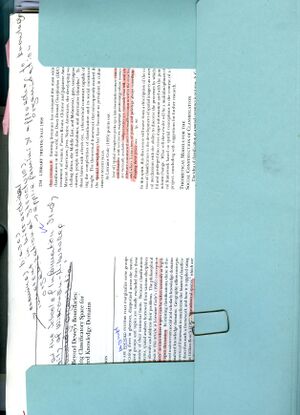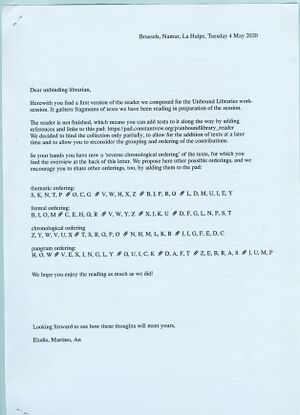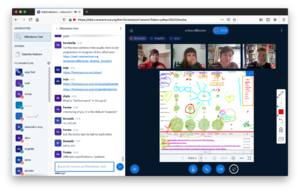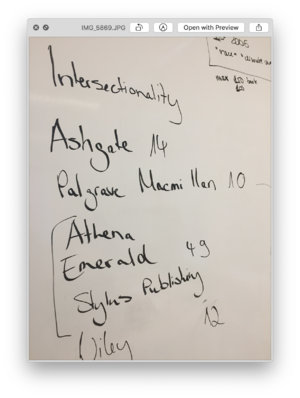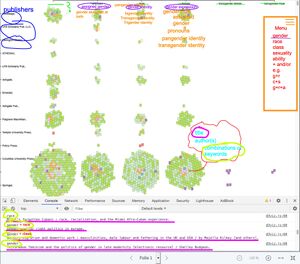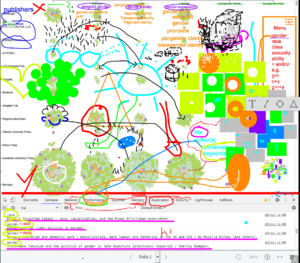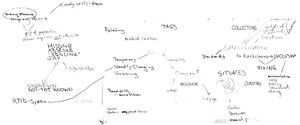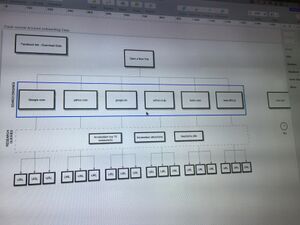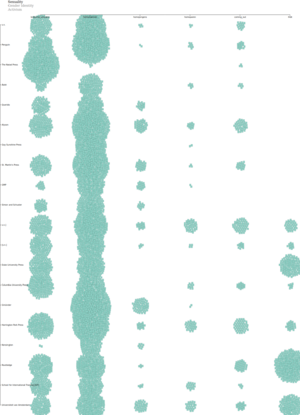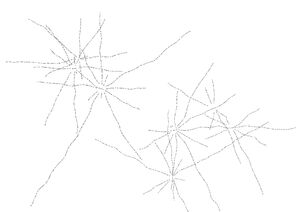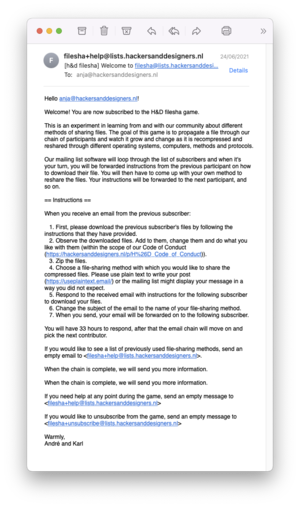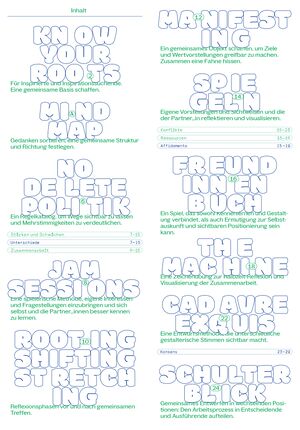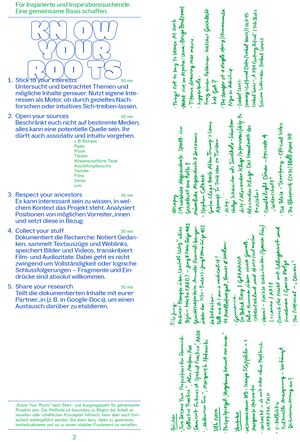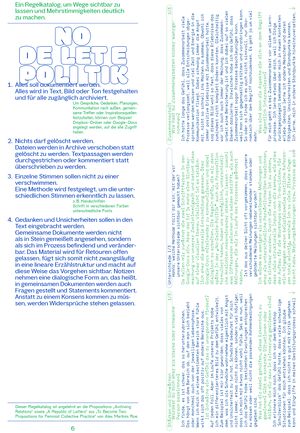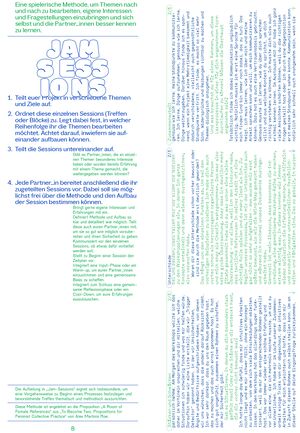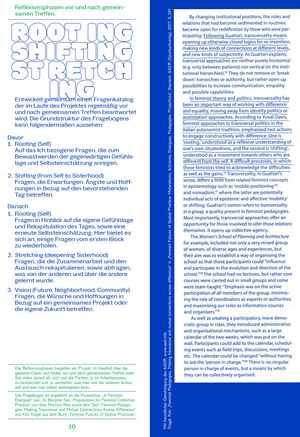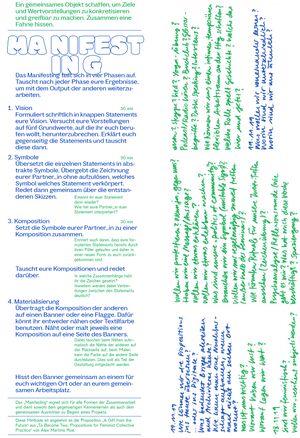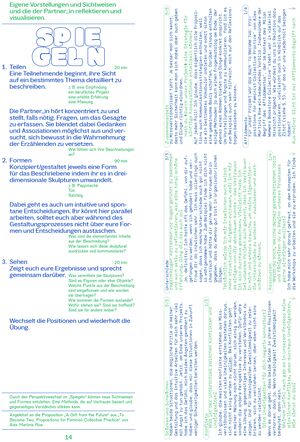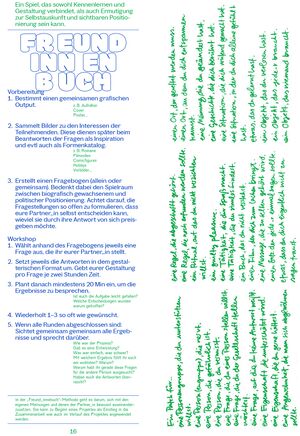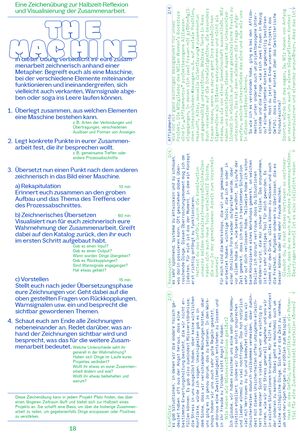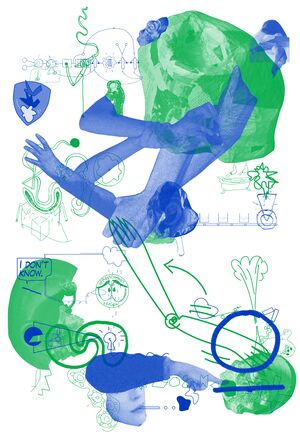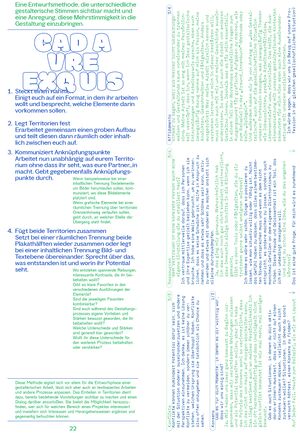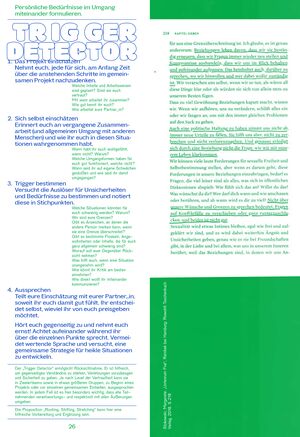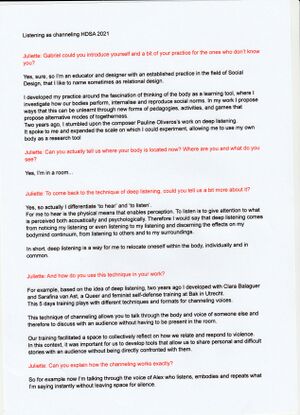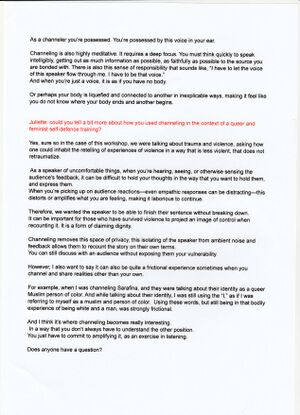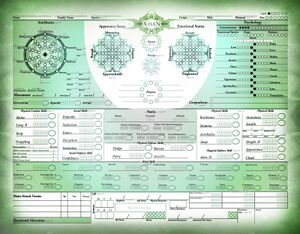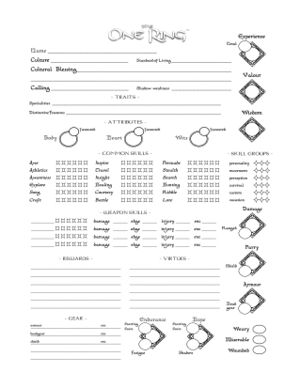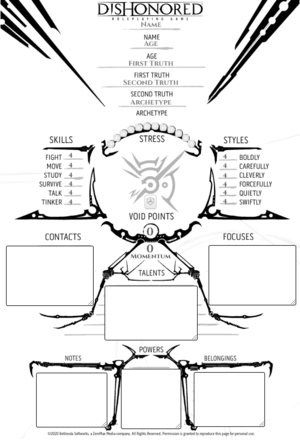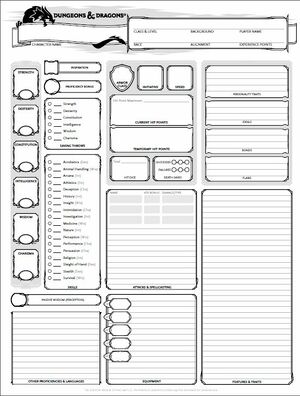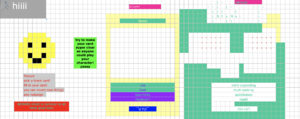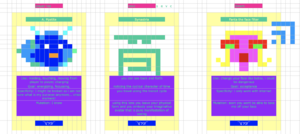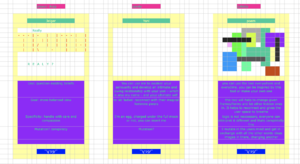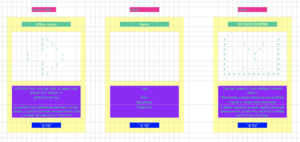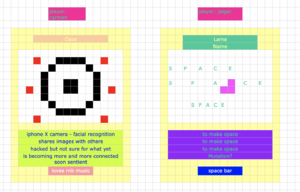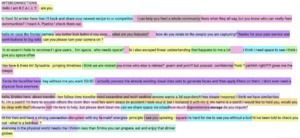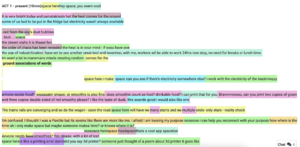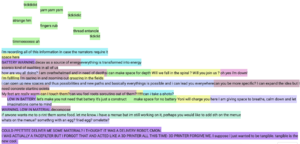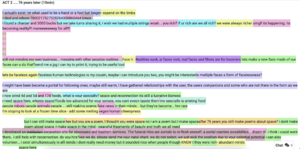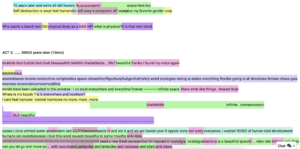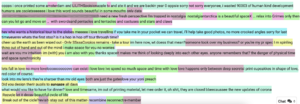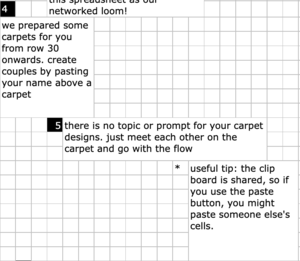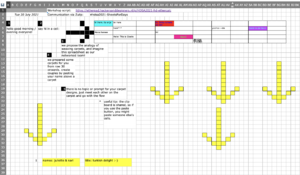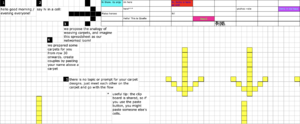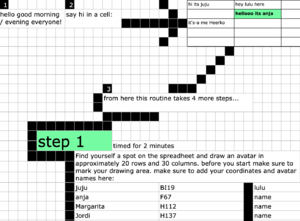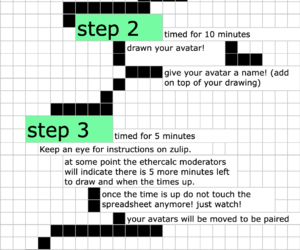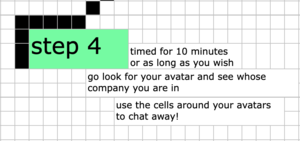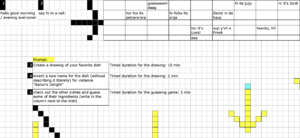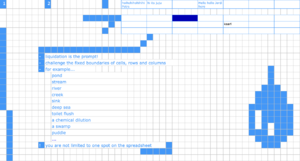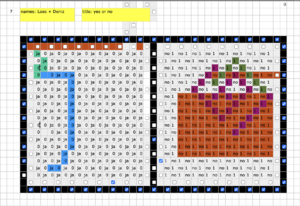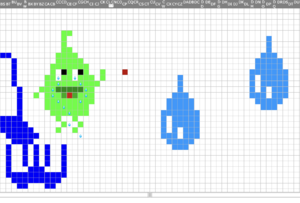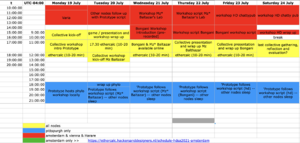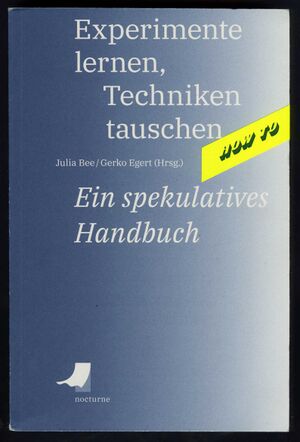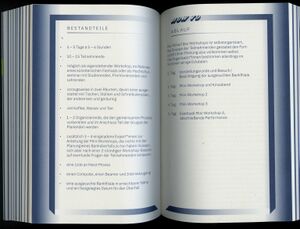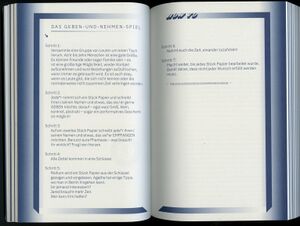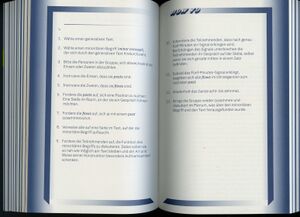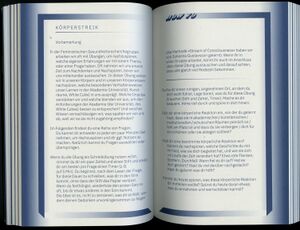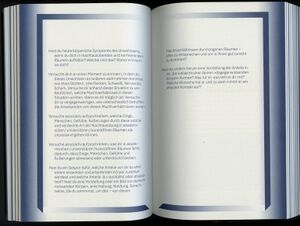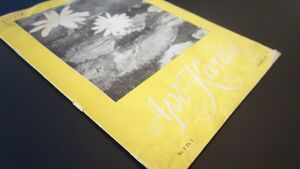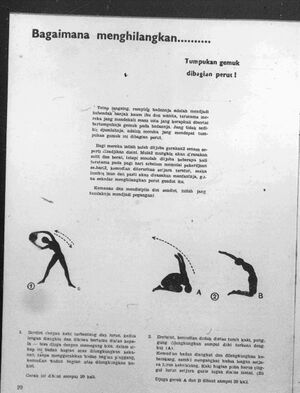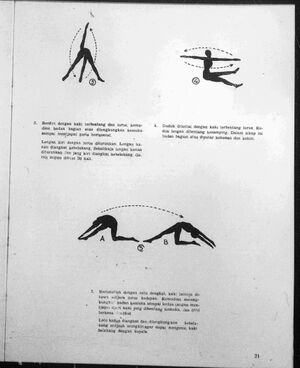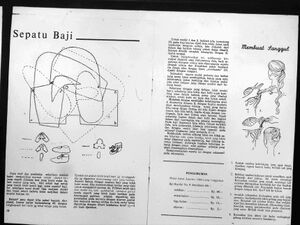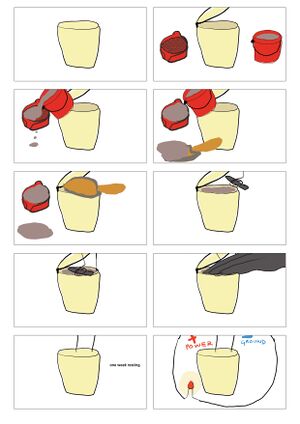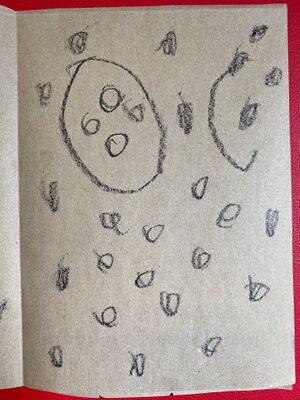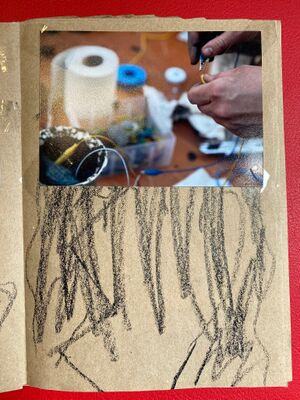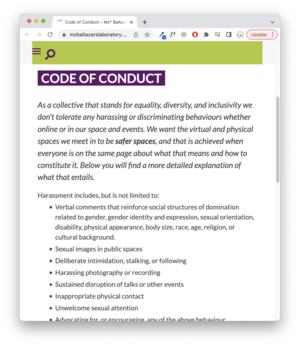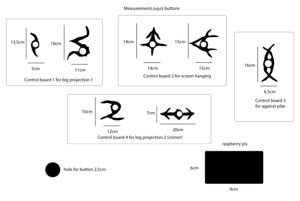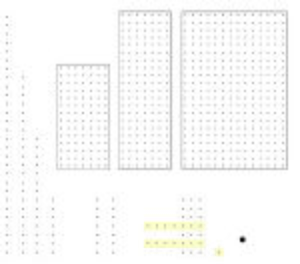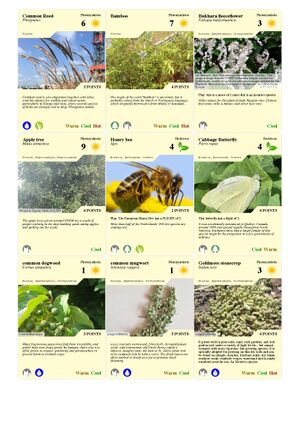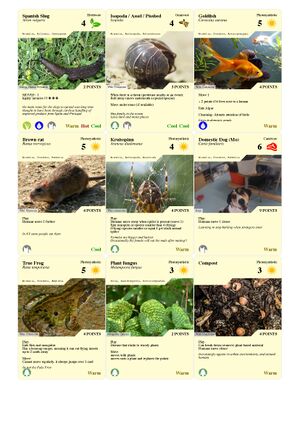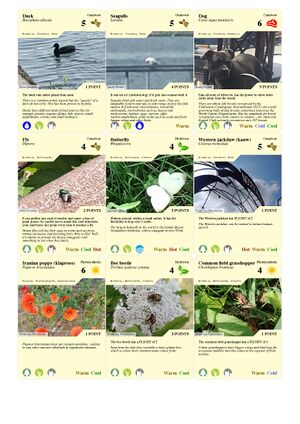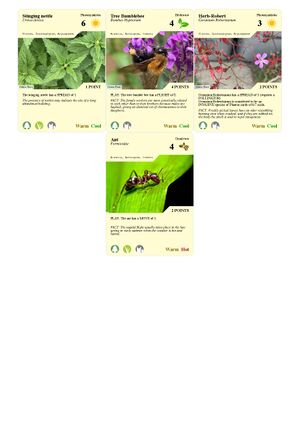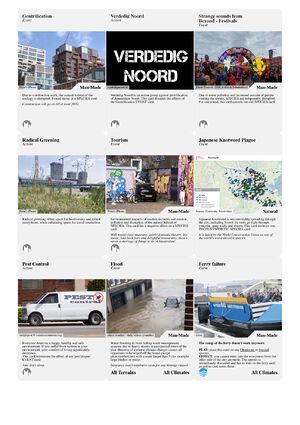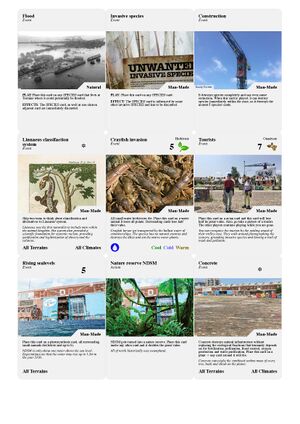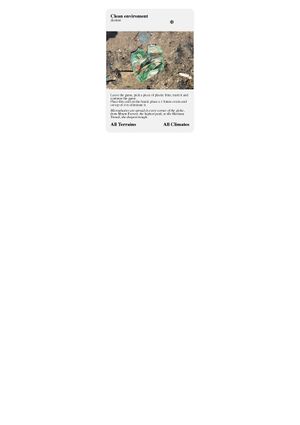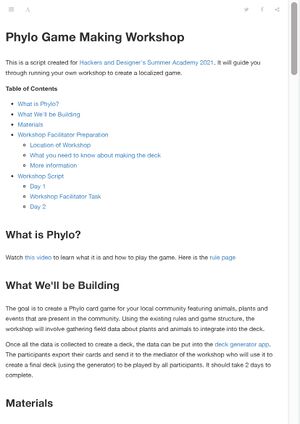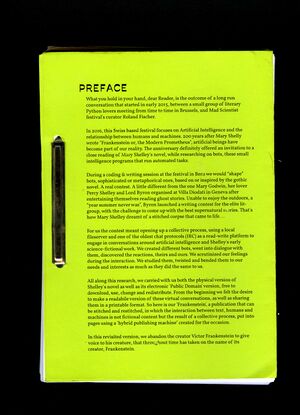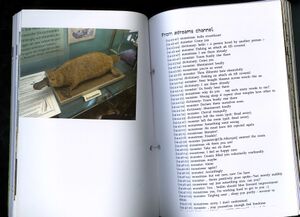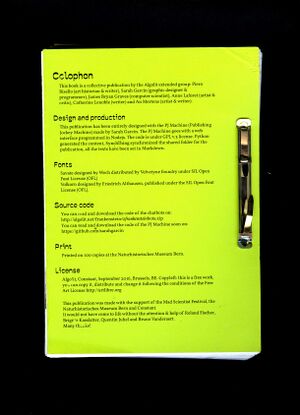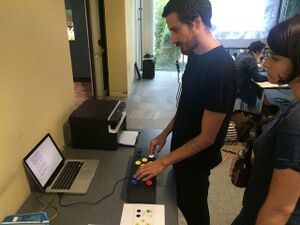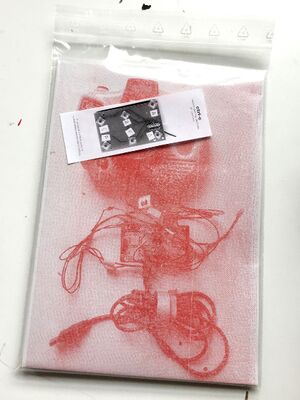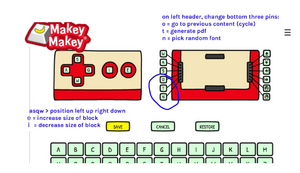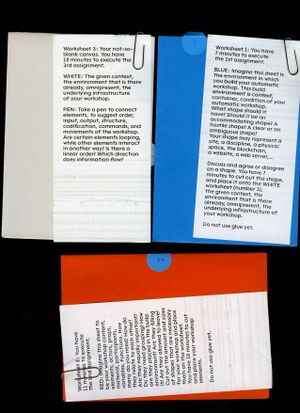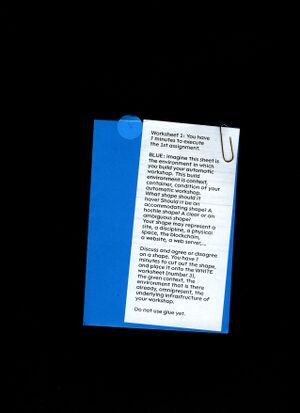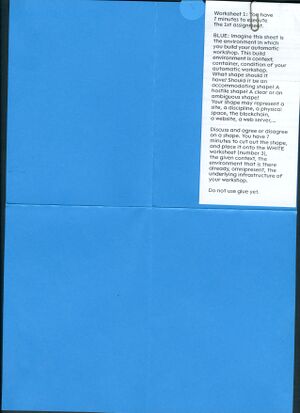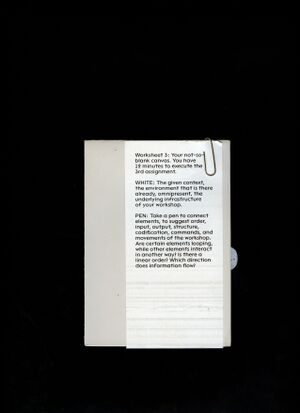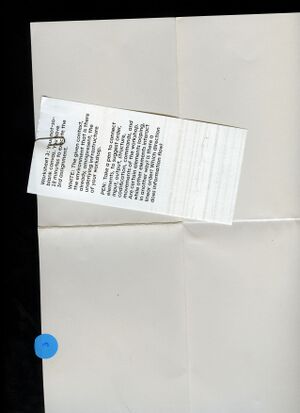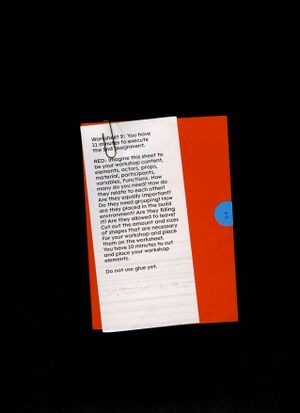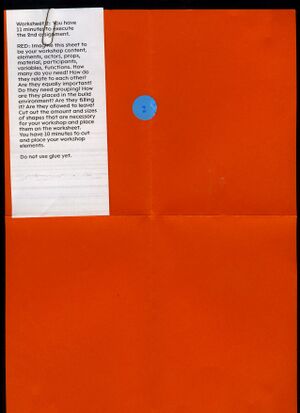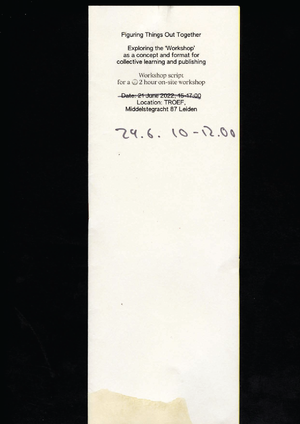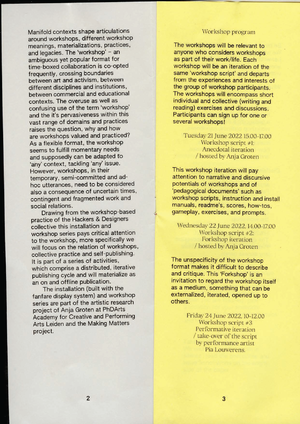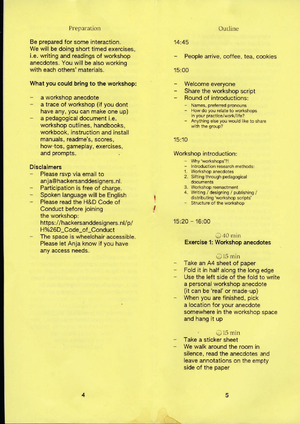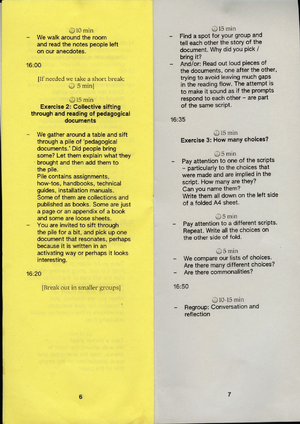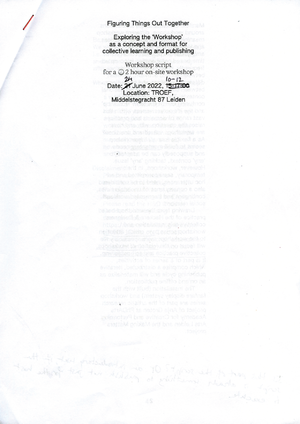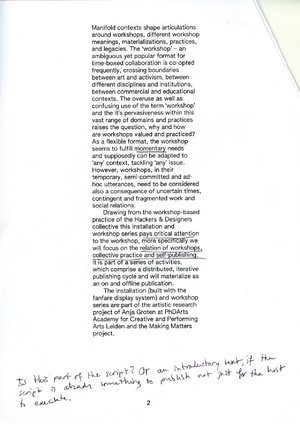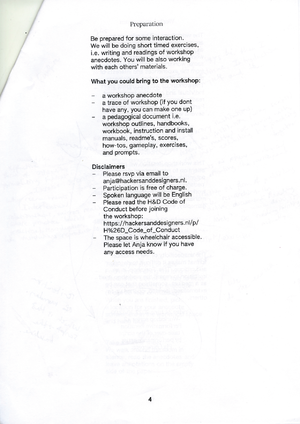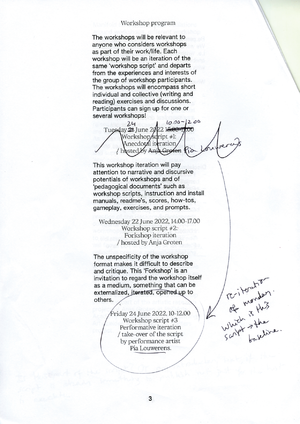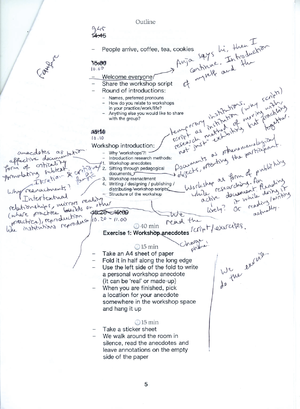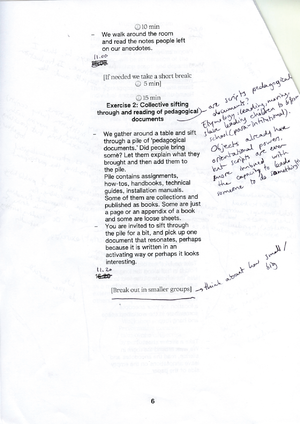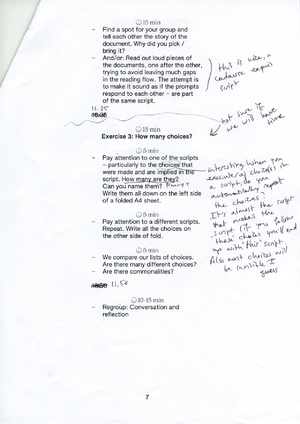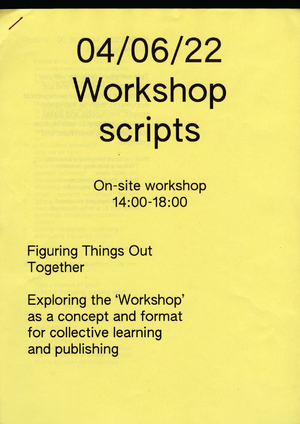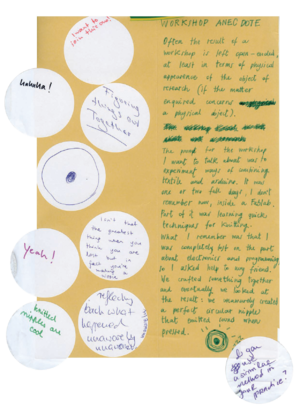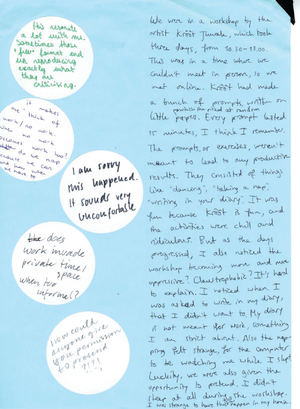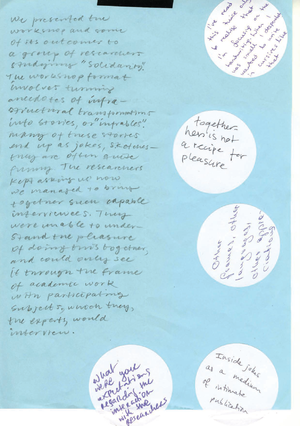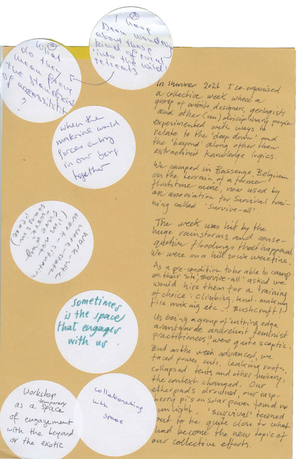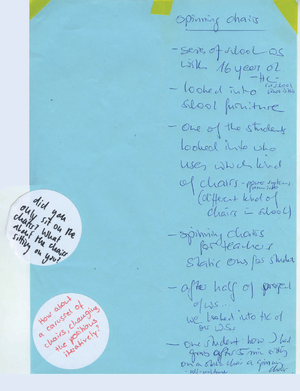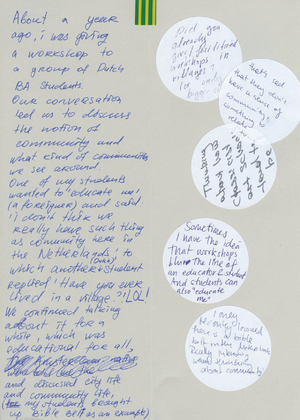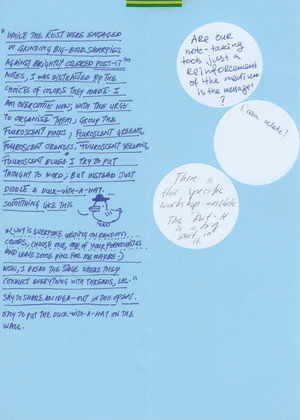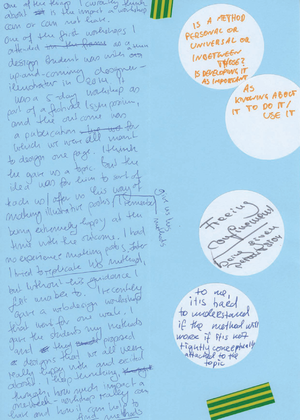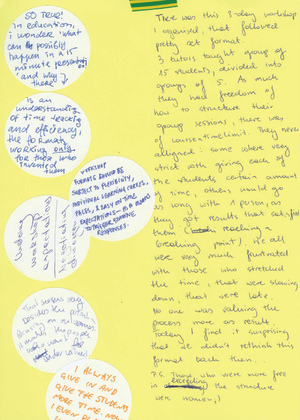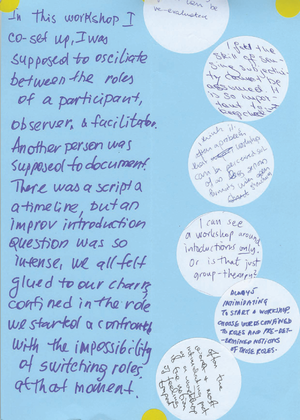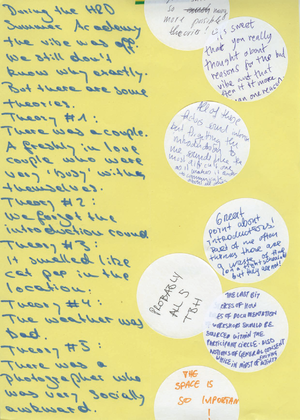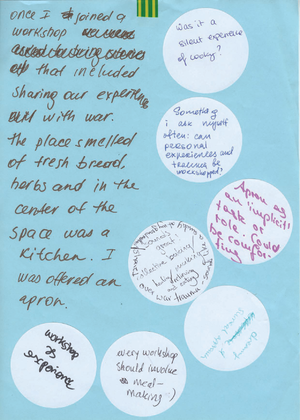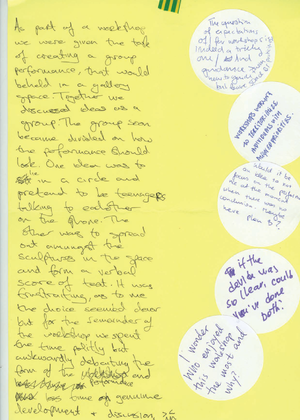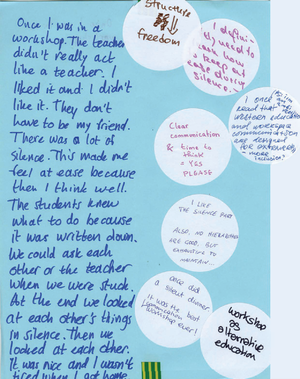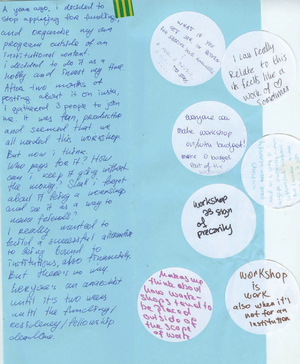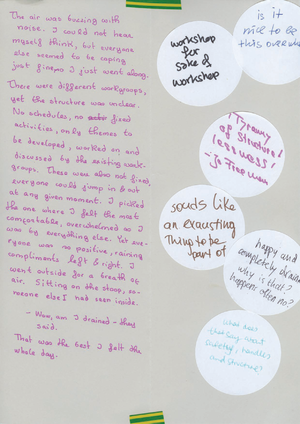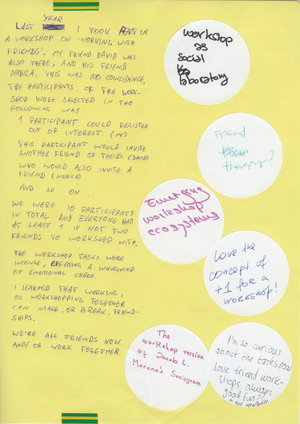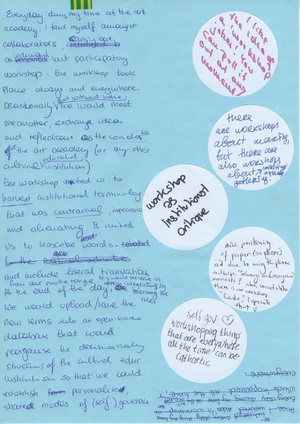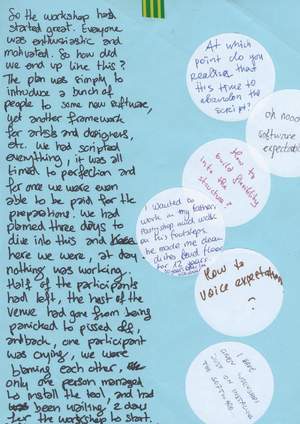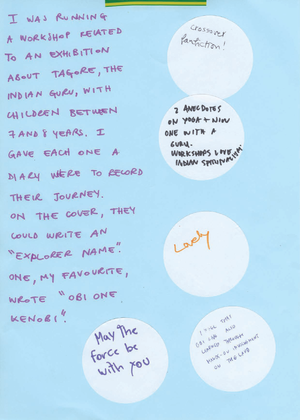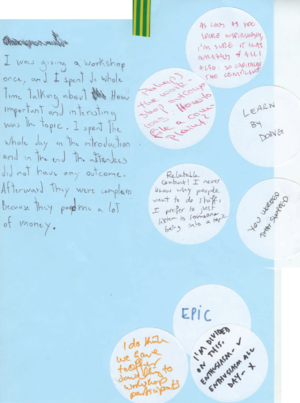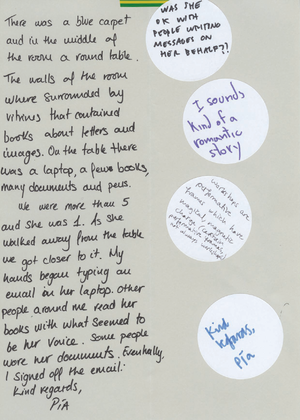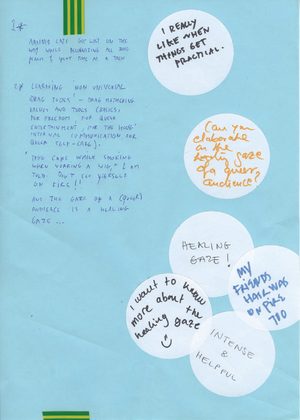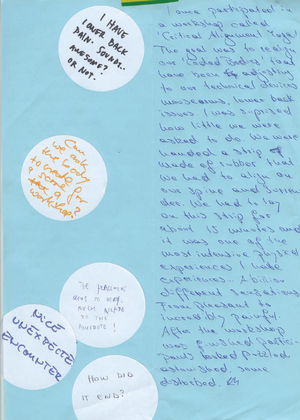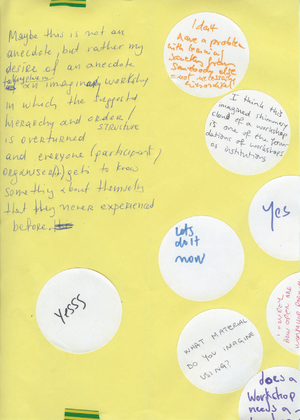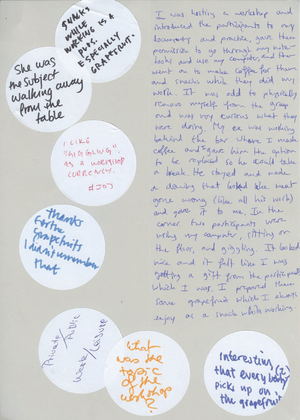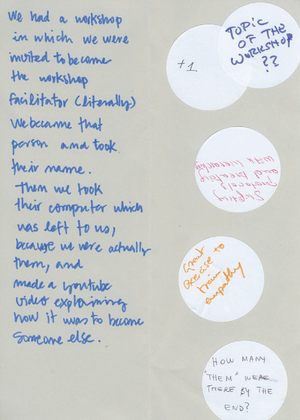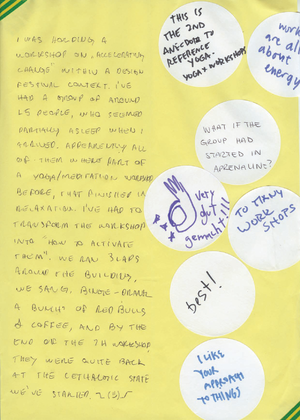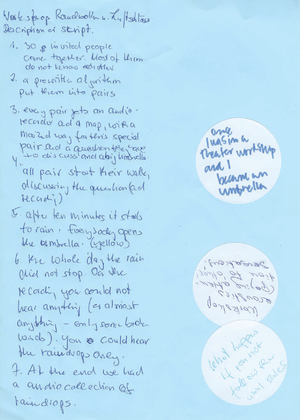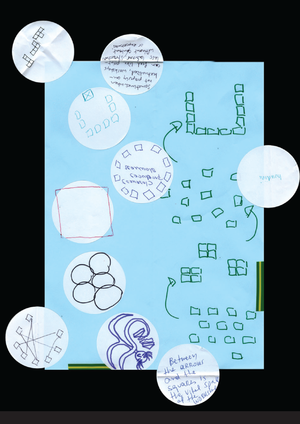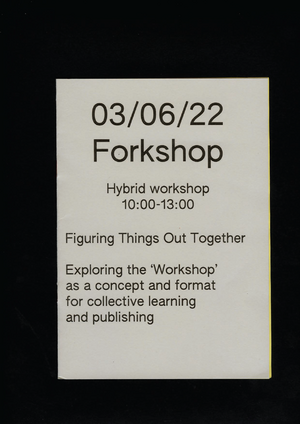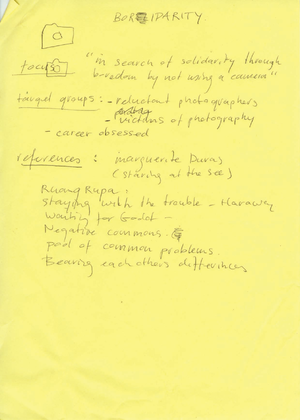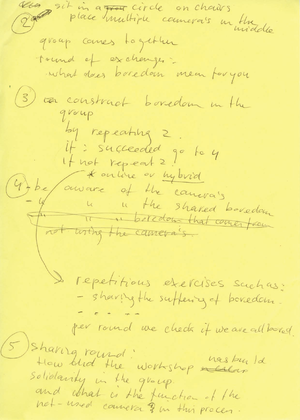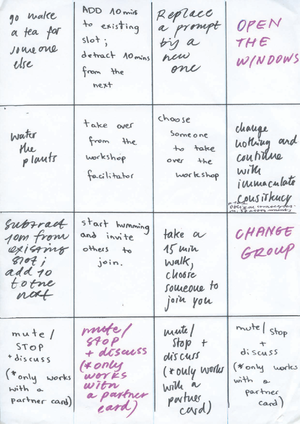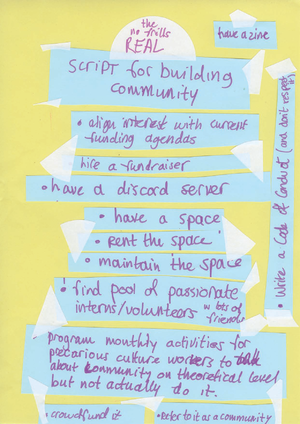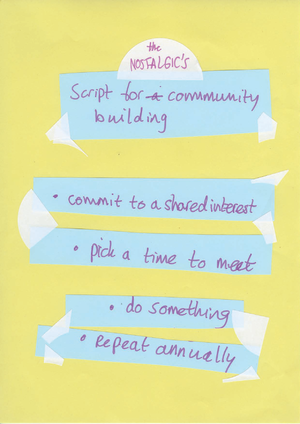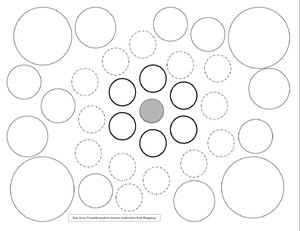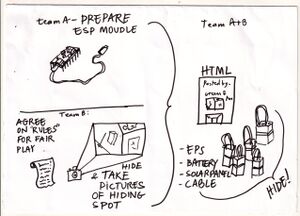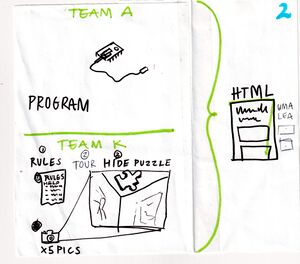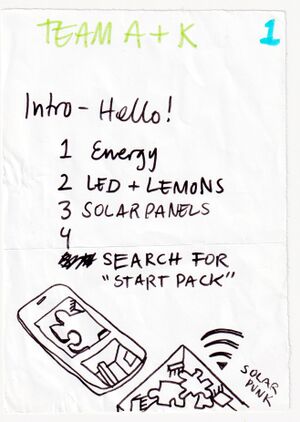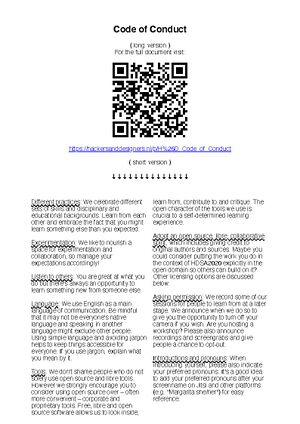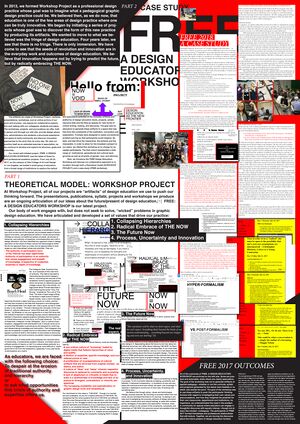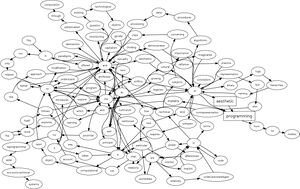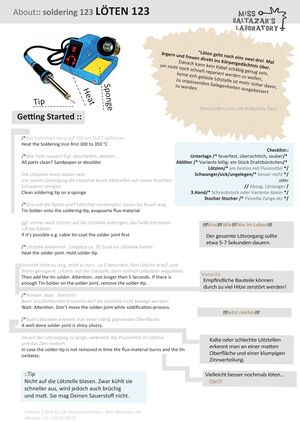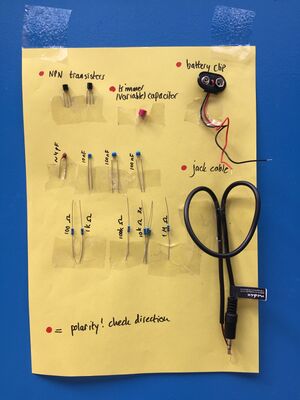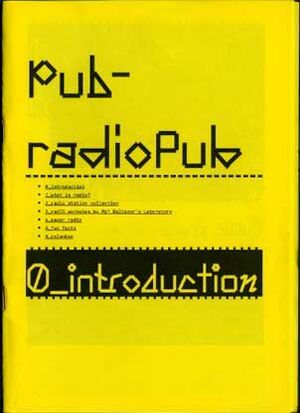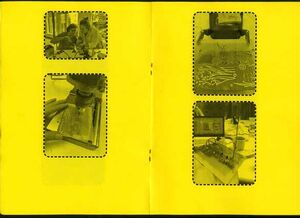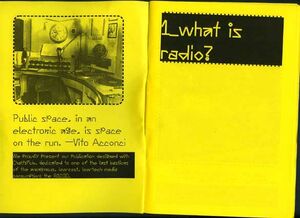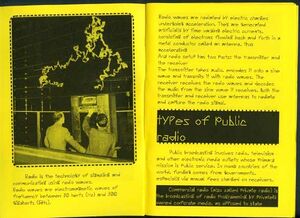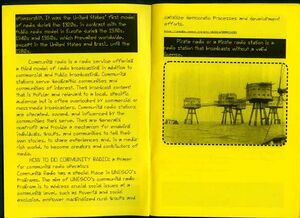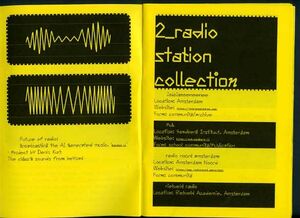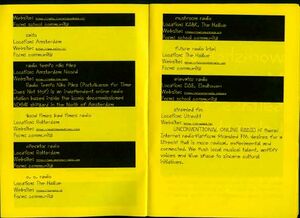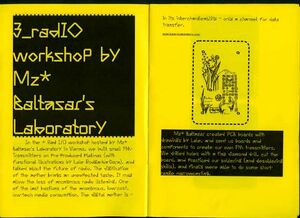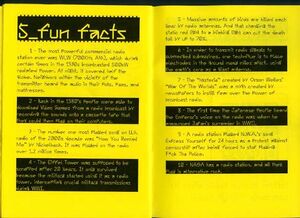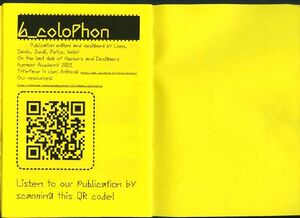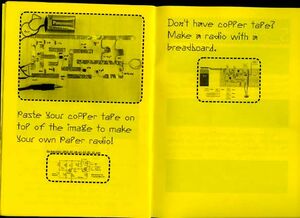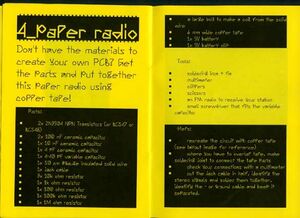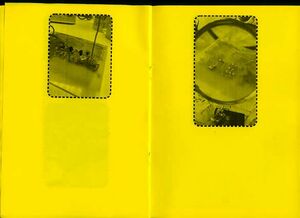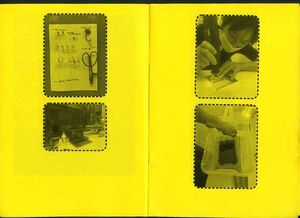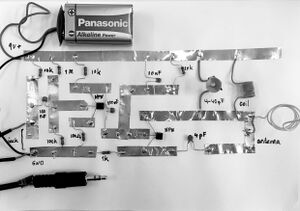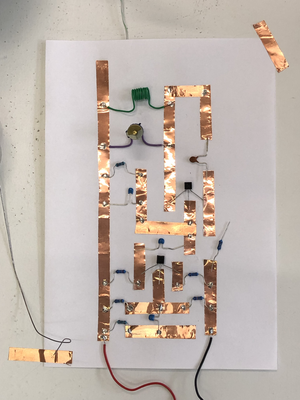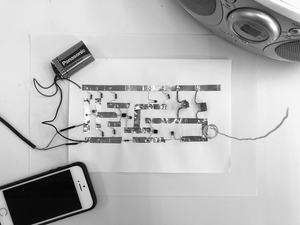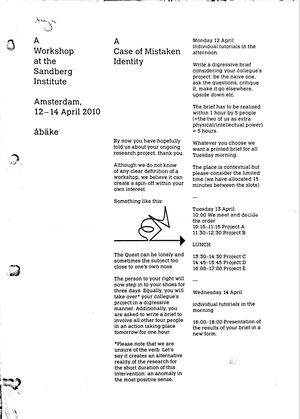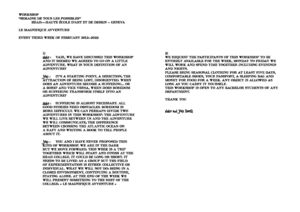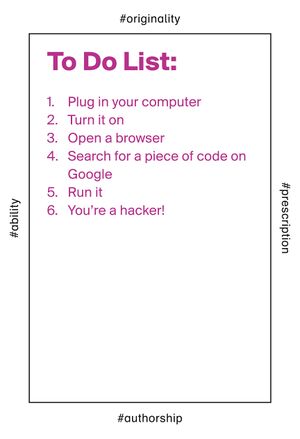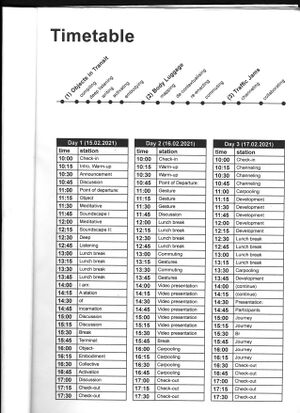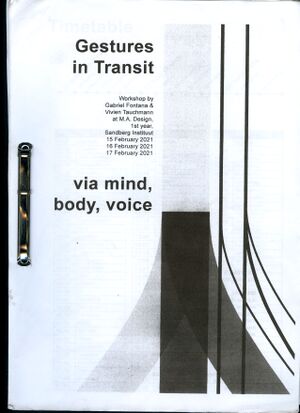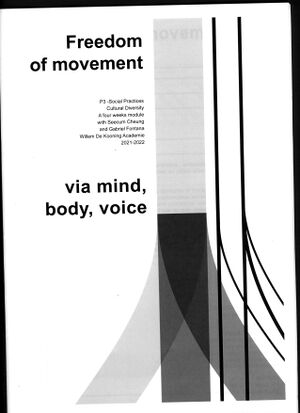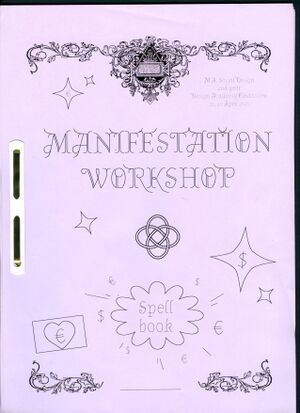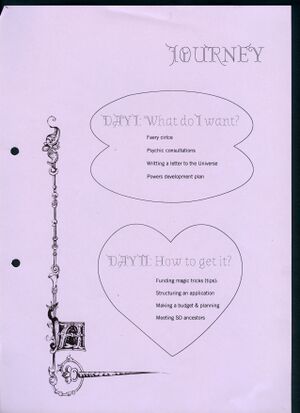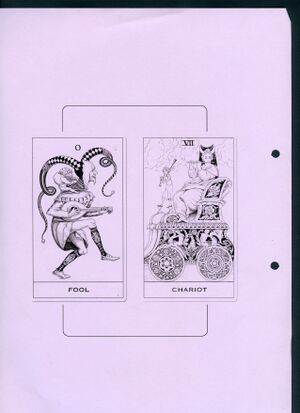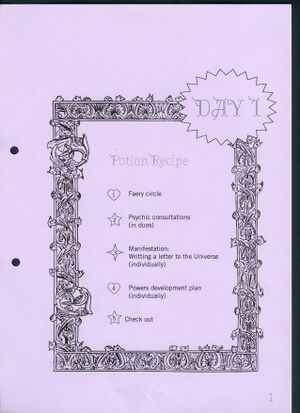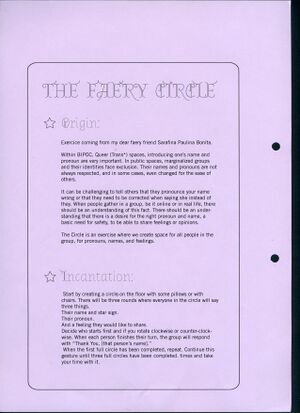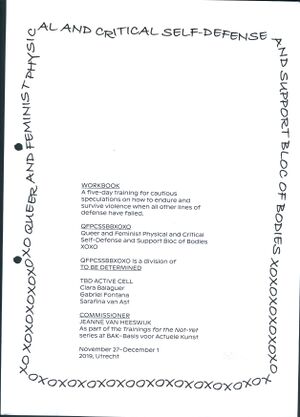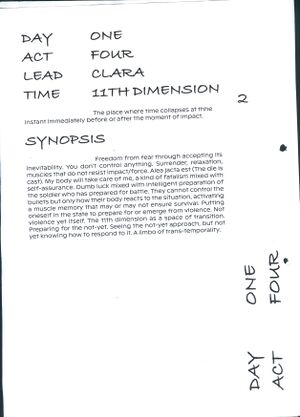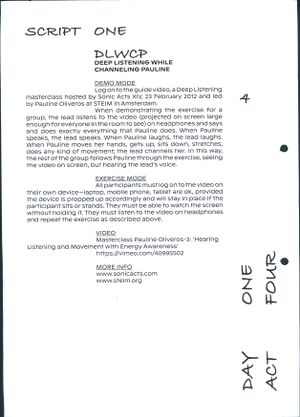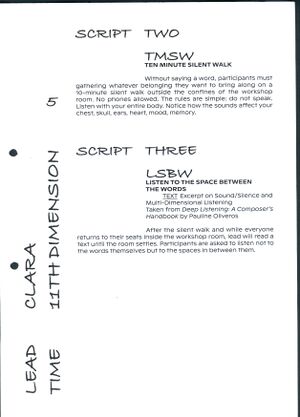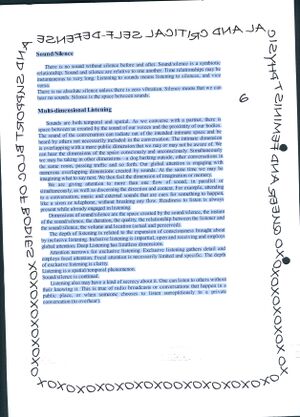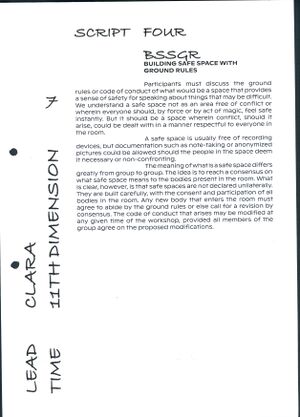First, Then… Repeat.
Workshop scripts in practice
Introduction
Compress your files. Pick a story. Form a circle. Find yourself a spot on the spreadsheet. Write an anecdote. Run the script. Download the zip. Continue the thread. Install the package. Go on a stroll. Follow each other. Slowly. Like a worm. Rename the repository. Return. Close your eyes. Take turns. Repeat. Come prepared. Nothing to prepare. No prior knowledge required. Be kind. Don't assume. Scoop the mud. Pick a time. Wash your hands. Watch. Swap. Strip the wires. Connect. Take your time. Rearrange. Share the link. Go to line 42. Make a copy. Be patient.
This publication draws together self-published and unpublished workshop scripts that evolved in and around the collective ecosystem of Hackers & Designers (H&D).[1] H&D has been organizing workshops since 2013, and along the way has established social-technical affinities that are loose and stable, temporary and ongoing. We met and befriended many practitioners and sister organizations since, and got acquainted with manifold, peculiar pedagogical formats, and experimental approaches to working, learning, and being together. This publication derives from an enthusiasm for the various ways collective learning environments take shape. It grew out of a curiosity for the ways that such practices are shared across different localities, timelines, and experiences.
Situated somewhere between documentation and a call for action, the workshop scripts presented here are companions to self-organized learning situations. They articulate and materialize aspects of such practice that cannot always easily be explained through existing frameworks. Contributions to this book document and reflect on self-organized learning situations that spontaneously assemble practitioners from various domains, diffusing disciplinary boundaries and blurring distinctions between learner and teacher, user and maker, product and process, friendships and work relations. They have in common that they seek affiliations beyond predetermined domains and bring together various vocabularies and methods all at once.
Documentation is rare, always incomplete, and it is therefore difficult to reconstruct what actually happens during such temporary collective learning communities. This is a challenge that art historian Heike Roms addresses in the conversation about workshop histories and practices, which offers a wider historical scope for some of the questions addressed in this publication. In her work, Roms is interested in the history of artist initiatives that reformed art education through self-organized educational experiments in the 1960s and ‘70s in the UK, when artists and educators began to organize study-groups for teachers and students in their private homes. Such evening classes were structured around exercises, and became a kind of parallel institution. Roms suggests this was an attempt to create an equal status between the participants. Roms also points out that conducting research into such initiatives is difficult as usually they were not well documented. The emphasis of such practices was on the momentary collective experience, and not so much on what was being produced at the end, though often there were occasions where work was publicly shared. With some luck, there might be some leftover notes or printed materials, such as announcements, flyers, posters, and pamphlets that hint at the character and content of the activity. But few notes remain from the exercises. On occasion Roms found a prompt, a class outline, or a score. However, the ways in which such prompts were perceived, enacted, and iterated on is difficult to reconstruct.
This publication addresses this challenge by drawing together workshop-based practices as a form of inquiry and by paying attention to the practice of (re)writing, (re)activating, documenting, and reflecting on “workshop scripts.” This is an attempt to discuss and show how workshops and workshop scripts shape—and in turn, are shaped by—the various environments they pass through. As a collection that holds various relational and iterative documents, it therefore cannot be considered a product or example of one specific kind of practice. The practices it draws together are site, context, and time specific, never complete, always ongoing, as are their various forms of expression.
Moving through manifold contexts—from institutional to grassroots informal—H&D as a collective is constantly in the making. Along the way, we are developing “terms of transition”[2]—socio-technical conducts that help us to navigate and “stay in touch” in uncertain times. Workshop scripts are traces of such an attempt. They are ephemeral documents that may be written by hand or take shape in open-source spreadsheets and notepads, Git repositories, Wikis, and mailing lists. These documents are brought into conversation and circulation and as such reveal something about the ways collective practices weave together a range of places, legacies, objects, and people across practices and disciplines, timelines and geographies. They are pragmatic as well as imaginative, capturing approaches, techniques, and atmospheres that evolve from within specific communities and practices, while holding together the chaosmos of collective self-organization.
For instance, the workshop script “ChattyPub,” gives instructions on how to “run” ChattyPub as a workshop and as a platform for discussion and as a publishing tool that explores a decentralized process of designing a publication and as an organizational open-source collaboration software. The script does not solely document an instantaneous workshop situation but rather explores the intersections between workshop/tool/platform/documentation/distribution. The script is pragmatic and invites others to take it on and run with it, while accounting for its entanglements within a specific socio-technical context.
As situation-specific and context-sensitive artifacts, workshop scripts take manifold shapes and roles in this publication. Some derived from the immediate or wider context of H&D and its members, some are historical examples, and some are works of fiction. They are accompanied by—or enmeshed in—anecdotes, essays, graphic novels, speculative how-tos, and reflexive conversations that both activate and situate them within the respective communities and practices. This eclectic collection of workshop scripts reflects the continued effort of building collective ties through documentation, the practice of sharing with each other, and paying attention to the details. You won’t find a precise definition of what a workshop script is. Instead you will encounter different ways that workshop scripts are understood, materialized, and put into practice across various contexts. A workshop script may be concise or expansive; it may include instructions and install manuals, code snippets, timetables, and readmes. It may also include context-specific, personal and narrative aspects.
This publication attempts to approach these scripts and the practices they involve not as products of linear or reproducible processes but as resulting from and implied in particular socio-economic, socio-technical conditions. As such, the publication resists a generalized approach to the reproduction of these scripts. When possible, the initial appearance of the scripts, their format, and layout are left intact, forgoing the impression of a blueprint. Thus, the contributions may require some commitment, some attunement, and “getting into.”
The idea for publishing these situated documents and their stories derived from both the frustration and joy of working and being together while negotiating unstable times and conditions, and paying critical attention to the fleeting nature of formats of encounter, as well as the continuous effort of staying in touch with those who we encounter. The scripts are never finished, they always require more work. In some ways this publication can be considered a scriptothek—a script collection that continues collecting. The script + othek contains bibliotheek. In the German and Dutch languages, the Bibliothek/bibliotheek is a place of careful collecting, deciphering, making available, and preserving the documents it holds and handles. Often, it is through the work and personal investment of a Bibliothekar*in that such a place and the documents it holds are activated and brought into circulation.
My approach as an editor is inspired by that of the Bibliothekar*in. Similarly, it is also through personal and to some extent subjective affinities that I collect, decipher, preserve, and circulate the stories intertwined with the documents this Scriptothek holds. It is rooted in—and energized by—a sort of distributed locality. For instance the workshop script “A Case of Mistaken Identity” by the graphic design collective Åbäke has been sitting in a pile of pedagogical documents since I received it as a workshop participant in 2010. It has been activated throughout the years, in implicit and explicit ways, and informed my personal appreciation for collective work in and outside art and design education. As you will read in the email conversation with Åbäke, my request to republish the document in this context unraveled an array of exchanges, tasks, and prompts.
Thus, besides representing or giving visibility to specific documents and practices, publishing this eclectic collection in and of itself became a generative, ongoing, and to some extent uncontrollable collective praxis. The scripts included in this collection are time stamped. They had (or will have) a moment, a place, and a people that activate them. Simultaneously, by entering this collection they also create new correlations and future outlooks. The featured documents and practices are iterative and ongoing yet not “off-the shelf,” not to be executed and re-used in any context; they each come with their own terms of transition.
Each contribution negotiated specific terms in order to enter this book—terms of activation, contextualization, adjustment, reconsideration, be it through specific licenses that were added or even by being taken out of the public domain entirely. For instance, I invited the makers of the Not For ANY licensing toolkit to contribute some of their exercises to this publication. The Not For ANY toolkit invited “collective engagement with open licenses from a (techno)feminist perspective in a playful and embodied way [...]” and included “a series of exercises to do this with.” And yet my invitation prompted the makers to take the toolkit offline. Instead, the initial page now serves as a redirect to other groups and practices who have been more intensively continuing and complicating the conversation around open licensing. Thus the editorial process set into motion new considerations about the conditions for further sharing (or not).
Clustering
To assist the reader, the contributions are organized into five clusters: Setting Conditions, Prompts, How-tos, Distributed Curricula, and Active Bibliographies. While the contributions are organized according to these clusters and appear in a linear order, they are also intertwined in multiple ways, and resist a linear narrative (forward-moving progressing, improving, innovating). Thus, readers are invited to be on the look out for other, multiple, and parallel connections and navigate the contributions idiosyncratically, non-linearly, in a zigzag, from back to front.
The cluster Setting Conditions pays attention to the specificity of self-organized collective learning environments, their site and context specific vocabularies, and social-technical conduct. The aforementioned conversation between Anja Groten and Heike Roms sketches a larger (historical) context and sets the scene for the contributions that follow. The contribution “Open-Source Parenting” by Naomi Walker and Erin Gatz of Prototype Pittsburgh, takes a “first things first” approach and attends to the conditions that need to be in place before being able to create or engage in any form of learning community. In their conversation, Erin and Naomi reflect on how Black women in Pittsburgh are creating a better future for themselves and how allies can support them in this work. The “Platframe Postscript” compiled by Anja Groten and Karl Moubarak reflects on the collective process of building an online workshop environment that converges various tools and practices in a manner that sustains their “contours.” Throughout the process of imagining, building, and activating this digital infrastructure the edgy term “platframe” reminded the collaborators that this online environment they are building together consists of many parts, which do not necessarily blend together nor are they experienced as seamless. Angela Jerardi discusses consensus-decision making models and practices, contextualizes them historically and in relation to contemporary activist communities. The project “WIN WIN” by James Bryan Graves and Nienke Huitenga-Broeren concretely and imaginatively explores conditions in which less polarized online debate is possible by proposing a consensus-based algorithm that mediates controversial discussion and collective decision making. In “Re-, and Undefinining Tools,” the Feminist Search Tools (FST) workgroup reflects on the slow collective process of building, narrating, and testing an ongoing and evolving library search tool through various workshops, and meetups in various contexts and constellations. This non-conclusive process creates a condition in which various context-specific definitions of tools can be expressed, as well as criteria for the usefulness or usability of such tools. In the following contribution, Qianxun Chen sets new conditions for the FST conversation. The generative textual system “Mycelines” brings to the fore recurring terminology and formulations that evolved from this collective reflection on a tool-building process. In “fileSHA as a Protocol” André Fincato and Karl Moubarak set the conditions for an asynchronous game by repurposing mailing list software.
Within the cluster Prompts inhabit concise propositions and calls for action. Prompts can be playful provocations, invitations to reconsider, to change direction; a proposal to approach something familiar differently. The contribution “Across Distance and Difference” takes into consideration the changing economic and material realities of Mio Koijma and Hanna Müller, who formulate small assignments for each other as an attempt to structure and sustain their collaboration in times and conditions that seem to work against their efforts. Sandy Richter reflects on her experience of participating in a workshop during the H&D Summer Academy (HDSA) 2021, during which it was not immediately evident what the prompt was, who the host was, and who was the participant, or observer/listener. Through her reflection, the prompt of the workshop host Gabriel Fontana, is slowly unraveling.
The prompts of the “Relearning Food” script challenge participants to pay attention to the routes our produce takes to reach supermarkets and eventually our plates. Their prompt is to reconsider grocery habits according to our geographies and localities. In her essay “Untitling”, Siwar Kraytem substitutes short anecdotes on the subject and practice of naming with prompts to trigger a discussion on the politics of naming.
The prompts of the “Spreadsheet Routines” by Anja Groten and Karl Moubarak as well as the “Etherpad roleplay” by Juliette Lizotte both utilize playful open-source collaborative writing and editing tools, which serve as workshop sites, which weave together prompt, method, and execution into an evolving collective techno-social narrative. Susan Ploets' LARP (Live Action Roleplay) script, “Skinship,” prompts participants to explore the condition of being a collective body that inhabits, shapes and is shaped by an environment through sensory information.
The contributions collected within the cluster How-to explore the tension between the pragmatism of workshop scripts on the one hand, and the imaginative, fictional aspects at work in such documents on the other. The contribution by Julia Bee and Gerko Egert offers a generous and comprehensive backdrop to the format and role of the how-to as it is explored in art, art education, and activism. They draw on several concrete examples of how-tos such as “The perfect robbery” by Juli Reinartz and Tea Tupajic, “Give and Take” by the Social Muscle Club, “Conceptual Speed Dating” by Brian Massumi, and “Bodystrike” by the Feminist Health Care Research Group. These prompts derive from a compendium of how-tos, the publication Experimente Lernen, Techniken Tauschen edited by Julia Bee and Gerko Egert, and the accompanying platform Nocturne. According to Julia and Gerko, “the logic of speculative pragmatism allows us to think of techniques not as something one needs to earn, or learn to master, but as a way to put into practice speculation in the midst of an actual situation.”
Similarly, contributions such as Mz* Baltazar's “Mud-batteries” and Juliette Lizotte’s “The Button Saga” are also rooted in actual situations, imbuing their reflexive stories with practical instruction. Juliette Lizotte recounts the eventful story of creating a seemingly straightforward interactive installation. The saga includes misunderstandings, pitfalls, and detours of working collaboratively, and negotiating diverging expectations and techno-social dependencies. Stefanie Wuschitz's graphic novel tells the history of the magazine Api Kartini that evolved from the Indonesian Women's movement GERWANI. The Api Kartini zines focussed on publishing and disseminating practical knowledge for Indonesian women in the 1950s and ‘60s around health, repair, fashion, self-defense, and negotiating better work conditions, but also contain elements of storytelling and poetry, and imagine alternative futures for women in Indonesia at that time. In “Display(ing)” the fanfare collective discusses the way a workshop script can be induced in an object. Through its material affordances, the modular display system designed by Freja Kir and Lotte van de Hoef carries its own script and has been enmeshed in the ongoing and morphing collective practice of fanfare, who have been traveling with the display since 2014.
The scripts and accompanying reflections collected in the cluster Distributed Curricula address aspects of time and duration, be it through timed exercises, through expressing a certain intentionality for continuation and longer-term engagement, or by paying attention to and taking as a starting point what is already there, the prevailing collective condition. Giselle Jhunjhnuwala reflects on the workshop Phylomon that catered to making and playing a cooperative game informed by local ecosystems. It addresses questions of longevity through the cooperative game mechanisms as well as the subject of building sustainable collective ecosystems, and durable ways of co-existing on planet Earth. The conversations “Interfacial Workhout” with designer, coder, and cook Sarah Garcin takes as a starting point one particular workshop instance and its residual effects within manifold workshop situations that followed. The text and accompanying scripts in “Scripting Workshops” further contextualize the notion of the “workshop script” in the context of the collective practice of H&D and reflect on our long-term commitment to organizing short-term learning situations.
The contribution “Am I a hacker now?” by Loes Bogers and Pernilla Manjula Philip about their intergenerational Solarpunk workshop reflects on an ongoing exchange and multi-local process of developing workshop scripts in collaboration with two sister organizations Mz* Balthazar's lab and Prototype Pittsburgh. While departing from the shared goal of developing intergenerational learning formats about and around sustainable technologies, the evolving workshop scripts took shape and were reshaped according to their respective local communities.
The publishing tool “ChattyPub” evolved from and fed back into various workshop situations, of which the first one was hosted by Xin Xin and Lark VCR at the HDSA. The goal of the workshop, designing and building experimental chatrooms, sparked the idea among H&D to develop ChattyPub—a platform and tool for co-designing a publication that utilizes a chat environment. In autumn of 2021, H&D self-published the book Network Imaginaries, which was designed with ChattyPub. Among others, contributors included Lark VCR and XinXin, who wrote a contribution about their “Experimental Chat Room” workshop, featuring the various chatrooms that were built during their workshop. For this publication we reconnected with XinXin to continue our conversation about their practice as educator, artist, and activist, taking as a starting point the “Critical Coding Cookbook,” which they recently published together with Katherine Moriwaki. (See cluster 'Active Bibliographies')
The ====== wiki reflections ====== by Yasmin Khan and Jessica Wexler look to the past and toward the future, exploring the ways a janky platform—the Workshop Project Wiki (WPW) developed by H&D (André Fincato and Anja Groten)—can shape a learning community for design educators. The very condition of the platform and its unfamiliar syntax transformed the intergenerational group of workshop participants into peers. After several iterations of the FREE educators workshop, the Wiki remains the key location for publishing prompts, documenting outcomes, editing a growing glossary, and planning future workshop iterations.
Contributions gathered under the cluster Active Bibliographies put forward careful selections of resources, generous catalogs, narrated reference lists, tips and tricks. They are active bibliographies because they are rooted in a sense of urgency and propose a shift. In “Critical Coding Cookbook,” Katherine and XinXin generously share their considerations and tactics of exploring their critical coding practices in parallel, local communities—informal educational environments that are multi-generational and non-hierarchical. Drawing on several “recipes” from the “Critical Coding Cookbook” they demonstrate multiple pathways to intersectional computing. Both contributions, “ChattyPub” and “Critical Coding Cookbook,” are exemplary of the inventive ways that collective practices initiate experimental and critical learning environments outside of or in parallel to institutional environments. And furthermore, they show how such conglomerates of critical makers and educators manage to create and sustain networks of like-minded practitioners—for instance through reusing code and methods, riffing off each other, co-organizing workshops, publishing and circulating their methods, and developing tools.
Petra Eros reflects on her experience of participating in the workshop + Rad I O by Mz* Baltazar’s Lab, which was further developed and hosted during the in 2021. She connects her workshop experience and the curiosities it sparked to various other initiatives with a stake in radio-making, and took her contribution as an opportunity to strike up an exchange with Good Times Bad Times community radio, which is published as part of her contribution. The contribution by Åbäke takes as starting point an assignment of a workshop hosted by Åbäke in 2010. In their email conversation Maki Suzuki and Anja Groten re-collect their workshop experience and reflect on their evolving pedagogical practices since.
Loes Bogers curated, edited, and commented on an array of resources that take as a starting point the question: How can we resist compliance with the unsustainable status quo of digital computing and electronics? The resources she draws together are accompanied by short personal reviews followed by short prompts that translate some of the concepts proposed into simple, practical exercises. This resourceful and active list evolved along with the Solarpunk workshop development trajectory.
Lastly, the conversation between Gabriel Fontana and Anja Groten took place while sifting through a pile of workshop scripts. Encountering these workshop scripts together and explaining what they meant to unravelled reflection on the various considerations that went into the specific workshops and their scripts, their different moments of activation, as well as their iterations.
